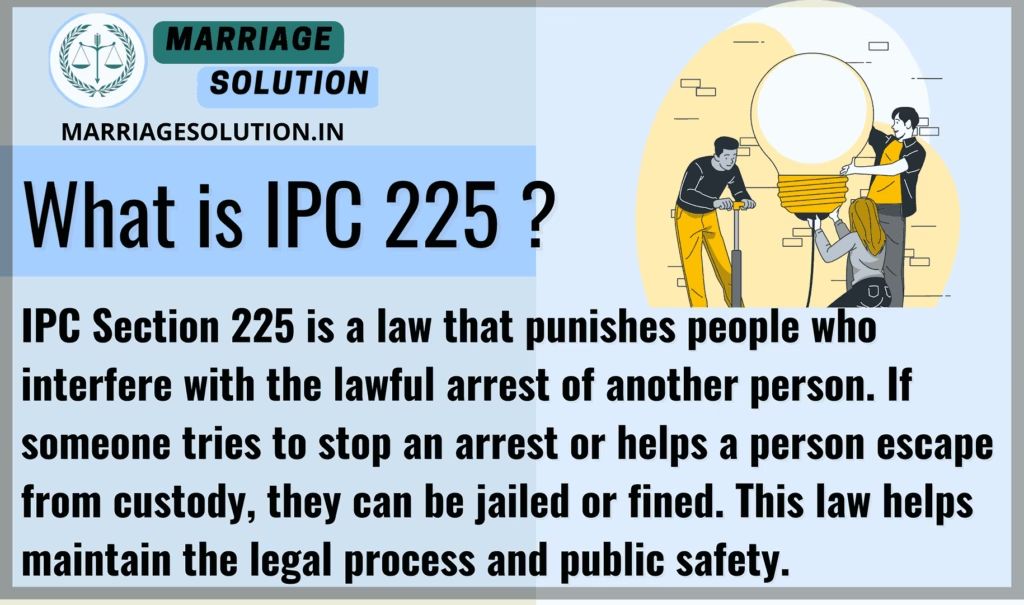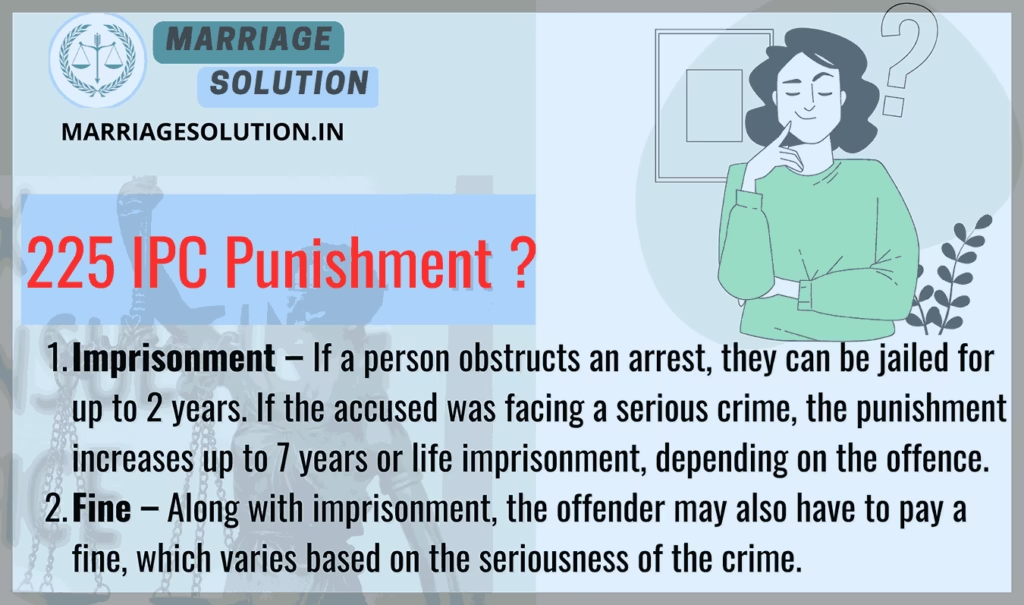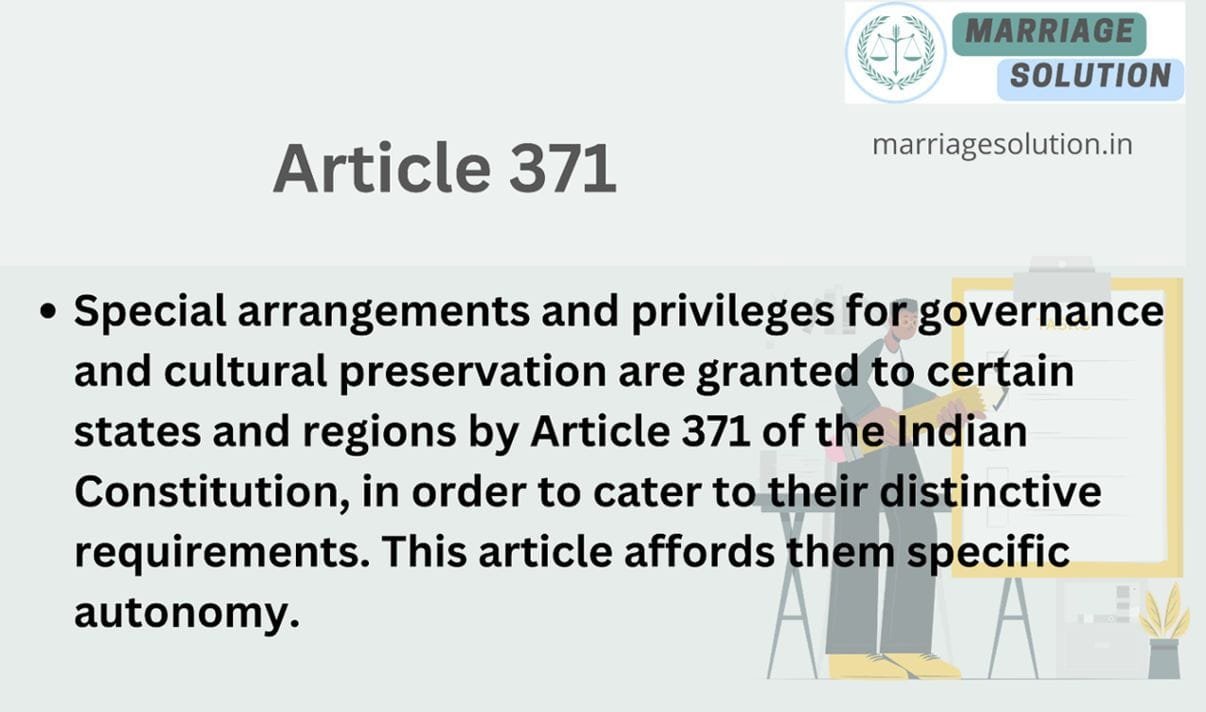Introduction of IPC 225
IPC 225 punishes anyone who tries to stop the police from arresting another person or helps a person escape from legal custody. This law ensures that criminals do not avoid justice due to outside interference. It applies to both minor and serious offences, with punishments depending on the severity of the crime.
- Introduction of 225 IPC
- What is IPC Section 225 ?
- IPC 225 in Simple Points
- Section 225 IPC Overview
- 1. Stopping an Arrest is a Crime
- 2. Helping Someone Escape is Illegal
- 3. Punishment for Minor Offences
- 4. Stricter Punishment for Serious Crimes
- 5. Severe Punishment for Death Penalty Cases
- 6. Protecting Lawful Custody
- 7. Applies to Everyone
- 8. Punishment for Interfering with a Court Sentence
- 9. Helping a Person Sentenced to Death is a Serious Crime
- 10. Ensuring Justice and Public Safety
- Example 1
- Example 2
- Section 225 IPC case laws
- 225 IPC Punishment
- 225 IPC Bailable or non bailable
- Section 225 IPC in short information
- IPC Section 225 FAQs
- If you need support with court proceedings or any other legal matters, don’t hesitate to reach out for assistance.
What is IPC Section 225 ?
IPC Section 225 is a law that punishes people who interfere with the lawful arrest of another person. If someone tries to stop an arrest or helps a person escape from custody, they can be jailed or fined. This law helps maintain the legal process and public safety.

IPC 225 in Simple Points
1. Preventing Arrest is a Crime
If someone stops the police from arresting another person, they are breaking the law. This includes physically stopping the police, hiding the accused, or misleading authorities. The law ensures that every accused person faces justice without outside interference.
2. Helping Someone Escape is a Punishable Offence
If a person rescues or helps an accused escape from police custody, they can face legal action. Even if the accused is innocent, helping them flee is a crime. The law ensures that only the court decides innocence or guilt, not individuals.
3. The Punishment Depends on the Severity of the Crime
If the arrested person is accused of a minor crime, the punishment for obstruction is up to 2 years in jail or a fine. If the accused was charged with a serious crime like life imprisonment, the person helping them escape can be jailed for up to 7 years.
4. Law Applies to Everyone Equally
It does not matter who is helping the accused escape—whether it is a friend, family member, or a stranger. If they resist or interfere with an arrest, they will be punished. The law treats everyone equally and does not allow favoritism.
5. Protecting Justice and Public Safety
This law is important because it prevents criminals from escaping and harming society. If people freely helped accused criminals escape, it would weaken the justice system. IPC 225 ensures that all legal arrests are respected and criminals face trial properly.
Section 225 IPC Overview
IPC 225 states that if any person resists or obstructs the lawful apprehension of another person or helps them escape from police custody, they shall be punished with imprisonment or a fine. The punishment depends on the severity of the crime for which the accused person was arrested. This law ensures that legal authorities can do their job without interference.
1. Stopping an Arrest is a Crime
If a person tries to stop the police or any lawful authority from arresting someone, it is considered a crime. The law ensures that nobody can interfere with the legal process of apprehending an accused person. This applies to all individuals, whether they are related to the accused or not.
2. Helping Someone Escape is Illegal
If someone rescues or helps another person escape from police custody, they can be punished under this section. Even if the accused person is innocent, helping them escape is still considered a crime. The law focuses on ensuring that legal procedures are followed properly.
3. Punishment for Minor Offences
If the person being arrested is accused of a less serious crime, the one who resists or obstructs the arrest can be jailed for up to 2 years, fined, or both. This punishment is meant to discourage people from interfering with lawful arrests.
4. Stricter Punishment for Serious Crimes
If the accused person is charged with a serious offence, such as one that can lead to life imprisonment or a jail term of up to 10 years, then the person helping them escape can face up to 3 years in jail and a fine. The law becomes stricter as the seriousness of the crime increases.
5. Severe Punishment for Death Penalty Cases
If the person being arrested or rescued is facing the death penalty, then the person who helps them escape can be jailed for up to 7 years and fined. This is to ensure that dangerous criminals do not escape from legal custody.
6. Protecting Lawful Custody
This section is important because it protects the legal system and prevents criminals from avoiding punishment. Without this law, people could easily escape from police custody with the help of friends, family, or others.
7. Applies to Everyone
The law applies to everyone, including friends, family, or even strangers who try to resist or obstruct an arrest. It does not matter why someone helps an accused person escape—if they do, they will be punished.
8. Punishment for Interfering with a Court Sentence
If someone helps a convicted criminal escape, they can face up to 7 years in jail and a fine. This applies if the criminal was sentenced to life imprisonment or a jail term of 10 years or more. The law prevents convicted criminals from avoiding their punishment.
9. Helping a Person Sentenced to Death is a Serious Crime
If a person under a death sentence is rescued or helped to escape, the person helping can face life imprisonment or up to 10 years in jail, along with a fine. The law is very strict in such cases because it involves the most dangerous criminals.
10. Ensuring Justice and Public Safety
The main reason for this law is to ensure justice and protect public safety. If criminals escape due to interference, it harms the legal system and puts society at risk. This law ensures that everyone faces justice fairly and that law enforcement is not obstructed.
Example 1
A person hides their friend in their house to stop the police from arresting them for robbery. The police later find out and arrest the friend and the person hiding them. The person who tried to stop the arrest will be punished under IPC 225.
Example 2
During a police raid, a group of people attacks the police officers to stop them from arresting a known criminal. Because they physically resisted and obstructed the police, they can all be charged under IPC 225.
Section 225 IPC case laws
1. State of Maharashtra v. Suresh Pandurang Darvakar
- The accused helped a criminal escape from police custody.
- The court ruled that this act obstructed justice and aided a fugitive.
- The accused was punished under IPC 225 with imprisonment and fine.
2. K. Ramakrishnan v. State of Tamil Nadu
- A person physically stopped the police from arresting his friend.
- The court ruled that preventing lawful arrest is a crime.
- The accused was sentenced under IPC 225 with imprisonment for obstructing justice.
3. State v. Ramesh Kumar
- The accused misled police officers by giving false information to protect a criminal.
- The court found him guilty under IPC 225, stating that providing false information is also obstruction.
- He was punished with imprisonment and a fine.
4. Mohammad Rafiq v. State of Rajasthan
- A person helped a prisoner escape from jail custody.
- The court ruled that assisting an escape from lawful custody is a serious offense.
- The accused was sentenced under IPC 225 with a jail term and fine.
5. Kalyan Singh v. State of Uttar Pradesh
- A person physically resisted the police and tried to free a thief during an arrest.
- The court held that interfering with police duties and obstructing arrest are punishable offenses.
- The accused was jailed for attempting to prevent legal action.
225 IPC Punishment
- Imprisonment – If a person obstructs an arrest, they can be jailed for up to 2 years. If the accused was facing a serious crime, the punishment increases up to 7 years or life imprisonment, depending on the offence.
- Fine – Along with imprisonment, the offender may also have to pay a fine, which varies based on the seriousness of the crime.

225 IPC Bailable or non bailable
If the offence is minor, it is bailable.
If it involves serious crimes like life imprisonment or the death penalty, it is non-bailable.
Section 225 IPC in short information
| IPC Section | Offense | Punishment | Bailable/Non-Bailable | Cognizable/Non-Cognizable | Trial By |
|---|---|---|---|---|---|
| IPC 225 | Obstructing lawful arrest or helping an accused escape from custody | Up to 2 years imprisonment or fine (for minor offenses) Up to 7 years imprisonment and fine (for serious offenses like life imprisonment or death penalty cases) | Bailable for minor offenses, Non-bailable for serious crimes | Cognizable if the accused was facing serious charges, otherwise non-cognizable | Magistrate or Sessions Court, depending on the severity of the case |
IPC Section 225 FAQs
What is the main purpose of IPC Section 225?
The law ensures that no one interferes with police arrests or helps accused persons escape from custody.
Can a family member be punished under IPC 225?
Yes, even if the person helping is a family member, they will be punished for obstructing justice
What is the maximum punishment under IPC 225?
If the person being arrested was charged with a serious crime, the punishment can go up to 7 years or even life imprisonment.
Is IPC 225 applicable only to police cases?
No, it applies to any lawful authority making an arrest, including court orders.
Can IPC 225 be applied if someone lies to the police to help an accused escape?
Yes, giving false information to stop an arrest is also considered obstruction and is punishable under IPC 225.
If you need support with court proceedings or any other legal matters, don’t hesitate to reach out for assistance.
Court or any other marriage-related issues, our https://marriagesolution.in/lawyer-help-1/ website may prove helpful. By completing our enquiry form and submitting it online, we can provide customized guidance to navigate through the process.
Right to Information RTI act :Your Comprehensive Guide (Part 1)
The Right to Information (RTI) Act : Explore the essence of the Right to Information (RTI) Act through this symbolic image. The image features legal documents, emphasizing the importance of transparency and accountability in governance. The scales of justice represent…
What is Article 371 of Indian Constitution ?
Article 371 of the Indian Constitution grants special provisions to specific states and regions within India, addressing their unique historical, social, and cultural circumstances. These provisions aim to accommodate diverse needs and protect cultural identities within the constitutional framework.
Indian Labour law : Your Comprehensive Guide (Part 1)
The purpose of labour laws is to safeguard employees and guarantee equitable treatment at the workplace, encompassing aspects such as remuneration, security, and perks. These regulations establish a secure ambiance by imposing minimum wage requirements, ensuring factory safety measures are…
GST :Your Comprehensive Guide (Part 1 – Understanding the Basics)
The Goods and Services Tax (GST) is like a big change in how we pay taxes in India. It started on July 1, 2017, and it’s here to simplify things. Before GST, we had many different taxes, and it could…





